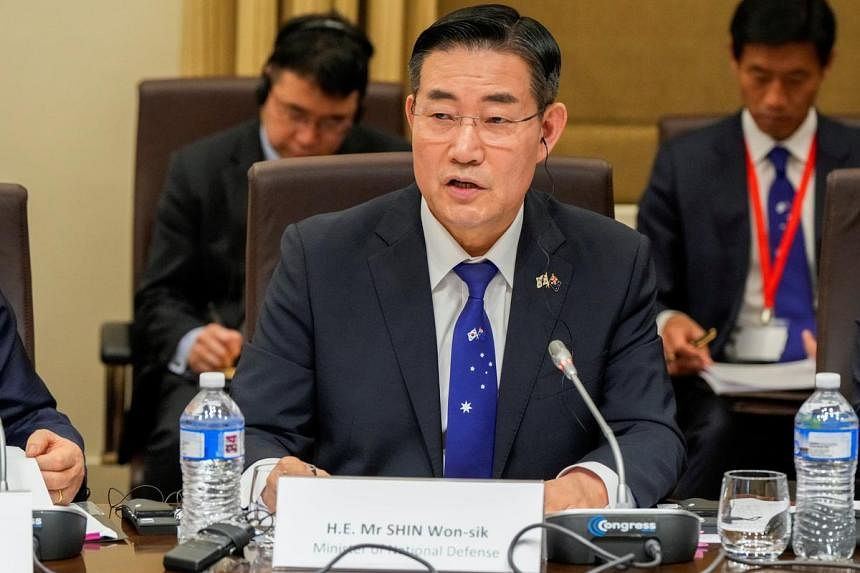SYDNEY - South Korea has held talks about joining part of the Aukus defence deal between the US, Britain and Australia, Defence Minister Shin Won-sik said on May 1, only weeks after the pact said it would consider including Japan.
Formed in 2021, Aukus is a two-stage security pact to counteract China’s growing power in the Asia-Pacific region.
While a first stage to give Australia nuclear submarine technology is limited to the core trio, they have raised the possibility of other countries joining a second stage, or “Pillar 2”, that aims to share other military technology.
South Korea could contribute to that second stage with its defence, science and technological capabilities, Mr Shin said at a news conference after a meeting between Australia and South Korea’s foreign and defence ministers in Melbourne.
“During today’s meeting, we also discussed the possibility of partnering with Aukus Pillar 2,” he said.
“We support Aukus Pillar 2 activities and we do welcome that members are considering Korea as an Aukus Pillar 2 partner.”
South Korea, with its close ties to the US and world-leading defence industry, has long been tipped as a potential Pillar 2 partner along with Canada, New Zealand and Japan.
Less than a month ago, the Aukus partners announced they were considering working with Japan on specific Pillar 2 defence projects and would hold talks over its involvement in 2024.
“Korea is a country with deeply impressive technology where we do have shared values,” said Australian Defence Minister Richard Marles.
“As Aukus Pillar 2 develops, there will be opportunities in the future, and we’re seeing that play out in relation to Japan as well.”
While South Korea has expressed its interest in being part of the Aukus arrangement, New Zealand is “a long way” from being able to make a decision on this, the country’s foreign minister said on May 1.
Foreign Minister Winston Peters said New Zealand must better understand the potential opportunities of cooperating with the pact on technologies, weigh up the economic and security benefits, and decide if it is in the national interest.
“The government is a long way from this point of being able to make such a decision,” he said in a speech to the New Zealand Institute of International Affairs in Wellington.
“But we should emphasise that it would be utterly irresponsible for any government of any stripe to not consider whether collaborating with like-minded partners on advances in technology is in our national interest.”
There is no suggestion that New Zealand, which has a long history of being nuclear-free, would join the first stage.
Mr Peters said before New Zealand could look at participating in Pillar 2, those involved in Aukus would need to want New Zealand to participate.
“That precondition has not yet been met,” he said.
New Zealand has become increasingly vocal about what it sees as growing security risks in the Pacific and more globally.
“Remorseless pressure is being exerted across it as beachheads are sought and influence peddled,” Mr Peters said.
Domestic critics of joining Aukus include former New Zealand prime minister Helen Clark, who has warned it would undermine the country’s independent foreign policy. Others have questioned Aukus’ aim of containing China and raised concern about its impact on New Zealand’s anti-nuclear status.
China, a vocal critic of the pact, said in April that adding new members would destabilise the region.
Expanding the pact faces hurdles from strict US restrictions on sharing technology, which Canberra and London worry could bog down the deal for all if new members are added too quickly.
The US State Department on April 30 unveiled a plan to relax those restrictions and make it easier to transfer military gear and sensitive technology to Britain and Australia. REUTERS

